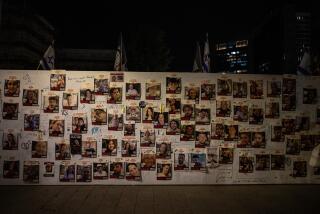Kicking the Wind : To Counter Terrorism, We Must First Know Our Objective
In participating by phone in a Pittsburgh radio talk show on Christmas Eve concerning the crash of Pan Am Flight 103, I found one thing obvious: Terrorism had won another round.
This was so even though the cause of the crash was not then known. Yet even if the midair breakup of the Boeing 747 had turned out to have been due to structural or mechanical failure, the damage to American morale and confidence had already been done.
Past terrorist attacks directed against Americans--hijackings, assassinations, bombings and the like--have sensitized us to the point where when a disaster occurs that has no immediate explanation, the terrorists get the âcreditâ whether they were involved or not. Such acts magnify our frustration and heighten our feelings of helplessness and rage.
As the host of the Pittsburgh radio show and his call-in guests made clear, they were themselves already convinced, evidence or no evidence, that terrorists were responsible. And the fact that the âterrorist warningsâ in Finland that had sparked an American Embassy alert in Moscow, airport precautions in Frankfurt and London and (after the fact) newspaper and television headlines here at home turned out on investigation to be a tragic coincidence has not altered those perceptions one whit. (The âwarningsâ turned out to have been sparked by a feud between two Arab expatriates in Helsinki who evidently routinely accuse each other of impending acts of terrorism.)
Mirroring the feelings held by many Americans in their revulsion over this Christmastime tragedy, the anger of members of the Pittsburgh radio audience was remarkably high. They wanted something done, and done now. What they wanted to know from me, a âmilitary expert,âwas where and how such action should be taken. But Iâm afraid that my answers were not what they wanted to hear.
As any military professional would have told them--and as Iâm sure the Joint Chiefs of Staff, if asked, would tell the President--the biggest stumbling block to a military response is the first principle of war, the Principle of the Objective. âEvery military operation,â it says, âshould be directed toward a clearly defined, decisive and attainable objective.â And the fundamental problem with counterterrorism is precisely the lack of such an objective.
Many Americans wished immediately after the incident that we would strike known terrorist centers--Libya, Iranian-backed factions in Lebanon, the Iranians themselves or even the Palestine Liberation Organization--on the off chance that one might have been responsible. But such a reaction would be like that of the man described by the redoubtable Mr. Dooley at the turn of the century who got mad at a hurricane for damaging his house and went outside and kicked the wind. It may have made him feel better, but it sure as hell didnât do him much good.
Such an action would violate the principle that any response must be âclearly defined.â And thatâs not an easy task in the convoluted and contradictory world in which international terrorist groups operate. Even when terrorists are obviously to blame, is it the terrorist faction that appears most guilty or is it the work of another faction that wants to make the other one look guilty?
In the most recent incident, could it be the work of a terrorist splinter group of the PLO? Could it be the work of those opposed to the dialogue that is beginning between the PLO and the United States? Or could it be neither? To strike the wrong target or to take the wrong action could serve the terroristsâ interests far more than our own.
Thatâs why the decision not to broadcast terrorist warnings to the general public was the correct response. The terroristsâ objective is not to kill people per se; like all acts of war, their objective is political--to kill people or threaten to kill people in order to frighten others to do their will and to sensitize the public to their political goals. We ought not to help them do that by serving as a sounding board for their threats and demands.
If a military response is not appropriate, then what is to be done? The answer is in more and better intelligence so that the objectives can indeed be clearly defined. And once those objectives are defined, the United States ought to be absolutely ruthless in exacting revenge--not for the sake of revenge itself but for the sake of discouraging such terrorist acts in the future.
And thatâs exactly the kind of action that we have not taken. Although we know who they are, those who several years ago took William Buckley, the CIAâs station chief in Lebanon, hostage and then slowly tortured him to death are still walking the streets of Beirut. If we want to retaliate against terrorists, they would be a most deserving group with which to start. Not only would they get whatâs coming to them, but their elimination might do wonders by demonstrating that America is truly serious about its anti-terrorist efforts.
More to Read
Sign up for Essential California
The most important California stories and recommendations in your inbox every morning.
You may occasionally receive promotional content from the Los Angeles Times.










